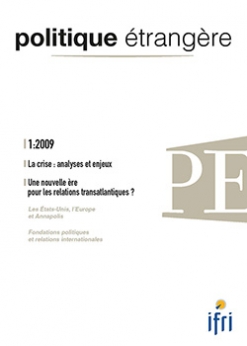
Politique étrangère n° 1/2009
Pour acheter ce numéro, contactez-nous
Recevez les numéros de l'année en cours et accédez à l'intégralité des articles en ligne.
La crise financière frappe une Europe institutionnellement mal en point. La présidence française a donné à l’UE l’illusion d’être gouvernée, sans instituer de gouvernance nouvelle. La Commission s’est marginalisée, et le Conseil n’a démontré aucune autonomie par rapport à sa présidence semestrielle. La Banque centrale est sans doute l’institution qui a le mieux réagi. Quant au traité de Lisbonne, il n’est pas bien sûr qu’il puisse remédier à une faiblesse persistante de l’exécutif européen.
The financial crisis hits European institutions that are already shaky. The French presidency gave the illusion that the European Union was well governed, even if the rules remained unchanged. The European Central Bank is presumably the institution which held best, while the European Commission became marginalized. Furthermore, the European Council has not proven autonomous enough in respect to the bi-annual presidency. As for the Lisbon Treaty, it is unsure whether it will be able to cure the European Executive’s persistent weaknesses.